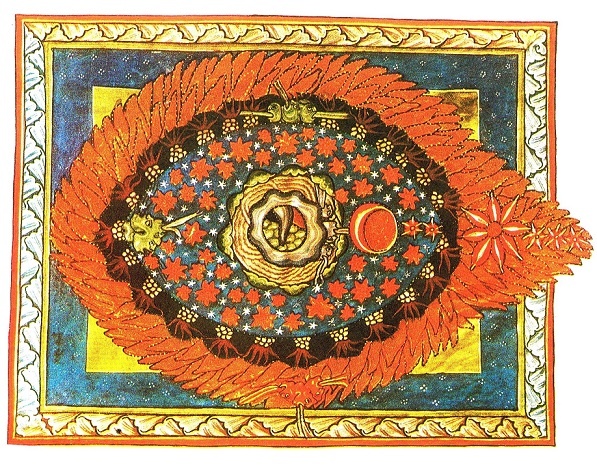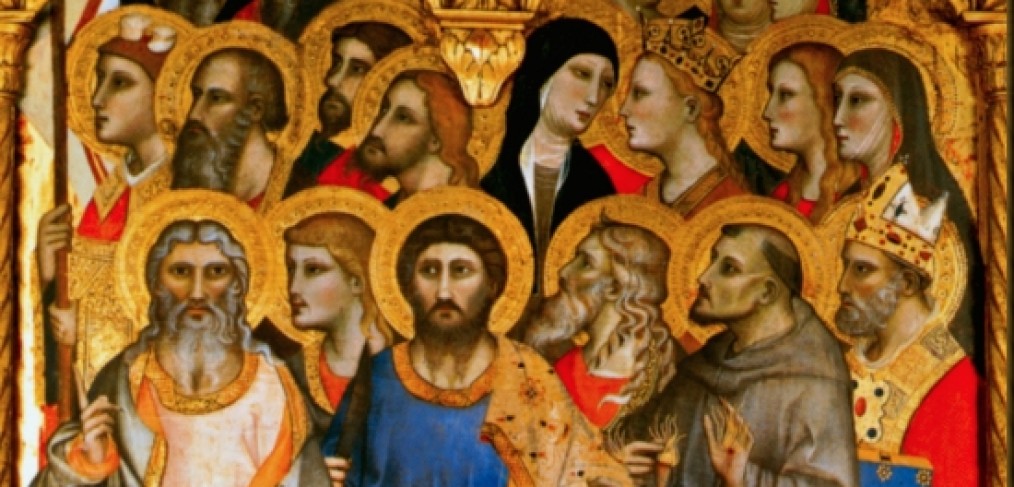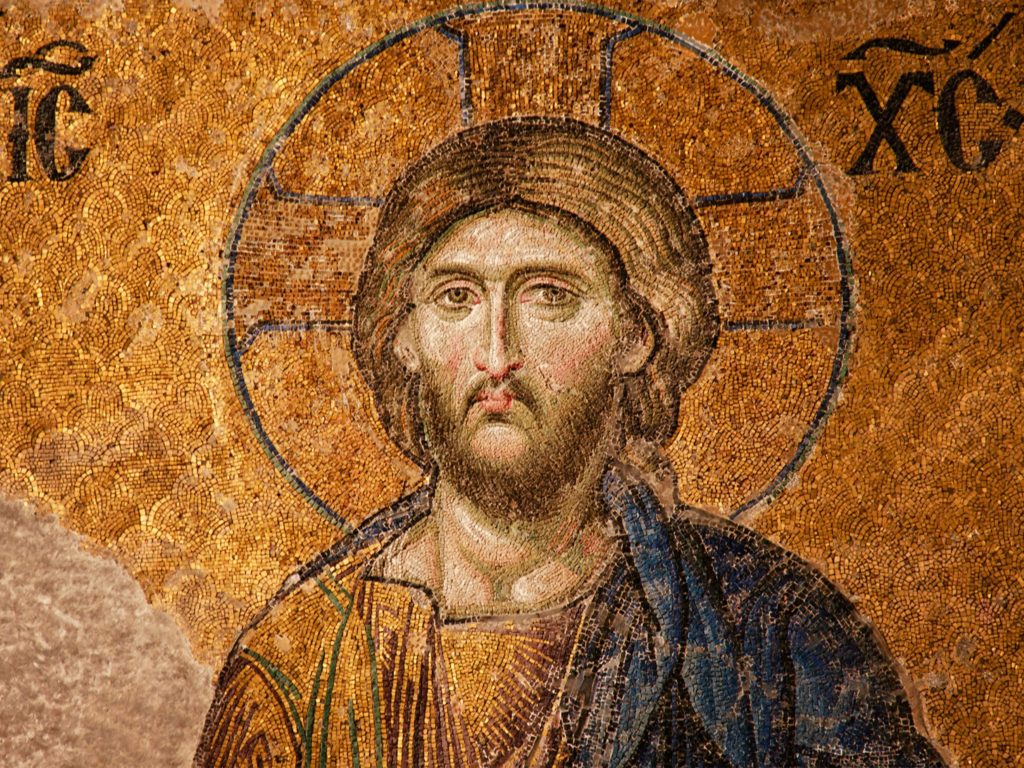
the 22nd day after Pentecost
Proper 27
10 November 2019
Today’s readings are:
Job 19:23-27a
Psalm 17:1-9
2 Thessalonians 2:1-5, 13-17
Luke 20:27-38
Click here to access these readings.
I want you to take out your service bulletins again, even though you probably just stowed them nicely away. Take out your bulletin with all the readings on it, the one with the big green bar at the top that says “22 Pentecost.” Now, the first part there isn’t a reading from the Bible (though most of the language is straight from our Scriptures); it’s a collect. Collects are prayers, and they’re always said at the beginning of our worship time on Sundays. There are collects for each Sunday of the year, and for each of the days after Easter, and for each saint’s day, too. They’re called “Collects” because they collect us, they bring is all in from each of our disparate lives and focus us, collectively, as the Body of Christ, the Church, on what we’ll be thinking about and praying about on each particular morning. If you have some time, read through some of these Collects in the Prayer Book; they’re beautiful, short prayers, and many Christians (and not just Episcopalians) use them in their own, private worship.
And if you looked at all the Collects, you’d notice that they all end pretty much the same way: “where he (that’s Jesus) lives and reigns with you (God the Father) and the Holy Spirit, one God, for ever and ever. Amen.” Hooray for the Trinity. And while all the words in here are important, there is one that’s very, very important: lives. Jesus Christ lives, with God the Father and with the Holy Spirit, as one God. Lives. Jesus is alive. Jesus Christ is alive.
Now, this might seem a little obvious to us, maybe. I mean, Jesus isn’t dead, right? That’s what we talk about every Easter: Jesus died on the cross but was raised from the dead three days later. But for the early Church, this idea that Jesus was alive was of utmost importance. Everything kinda hinged on this. The Good News that they were to proclaim was that Jesus was alive, that he was resurrected, and that this made all the difference. And with Jesus, the one who Jesus himself called “father”, God, who created the universe, is also alive. And the Holy Spirit, sent on the day of Pentecost to form and sustain the Church, is also alive and present with us, even now, two thousand years later. As Jesus tells the Sadducees in our gospel reading this morning, “God is not of the dead, but of the living.”
And on this morning, two thousand years after the Resurrection, two thousand years after a small group of women, one morning, found an empty tomb and an angel sitting around just to tell them that Jesus wasn’t here, that he was Risen, on this morning this is all still Good News. Jesus is alive. The whole Trinity is alive. But what does this mean, alive? We can understand, surely, the excitement and confusion and utter joy of the disciples that the tomb was empty and that their beloved friend and God wasn’t dead and that they could still talk to him and hold him and break bread with him and hear his voice again. Surely we can understand their excitement, but what about us? Is this still Good News to us, or just old news? Is it news that fills us, or is it news from a long time ago that’s great, but, really, what about now? What does it mean that Jesus is alive?
Well, I mean, there’s theology for you. If you want to know the answer then read all the works of Thomas Aquinas, come back and listen to ever sermon I give until I retire, pray unceasingly until your last breath, and feed the hungry and clothe the naked. Then maybe you’ll catch a glimpse of what it means for Jesus to be alive. But we don’t have to know the full reality of God (as if we could) for us to step towards him, and for that Good News, that Jesus is alive, to have meaning for us today.
Let me tell you a quick story: this past summer, Gwendolyn spent a bit of time in a small, blow-up pool we have. It really was small, not much more than something to get your feet wet, but Gwen liked splashing around it in to cool off. We emptied it each evening because we didn’t want the grass beneath it to die or the pool to start to mold, and then filled it up when Gwen wanted to use it again.
And to fill it, we usually just stuck the hose in the pool and let it fill. And when the water got to a certain height, the end of the hose dipped beneath the surface. It was still filling up the pool, of course, but you couldn’t see the usual rush of water the comes out the hose. And Gwen kept asking, is it on? Is it filling up? Is it on? Yes, it’s on! Jesus is alive kinda like that hose is on.
Poor analogy maybe, and it certainly doesn’t tell the whole story of Jesus, but I think it’s important. Often, when we think of “alive”, we think of exuberance. When we think of someone who’s alive, we think, maybe, of someone out running each morning, or someone who laughs easily and heartily, or someone who’s fresh and open and just in love with life.
But, often, life looks a lot different than that. Life can look worn and dirty, like a baseball mitt that’s seen a lifetime of games. Life can look like a cookbook that’s covered in grease and cookie batter and grubby little fingerprints because it was used to make food that fed people. Life can be present in a hospital room, and it can be present at the grave. For we believe, we Christians believe, that Life Itself was hung on a cross and died, but that even such a death wasn’t strong enough to hold him back from rising to Life again.
Over the next week, from this Sunday to next, I want to give you a challenge. We all have things that fill us up. Some of us are gardeners, some of us love reading. Some have children or grandchildren who touch us deep in our hearts. Some of us may be filled by going to meetings, who knows, but we’ve all got things in our lives that we see as refuges, places of peace and comfort, of grace and love.
I want to challenge you, however, to seek out life elsewhere. Open your eyes and open your heart to life elsewhere as well. Reach out into places of your life that make you tired, or frustrated, or that rattle your nerves. And in these places, ask the question, Jesus, who was raised from the dead two thousand years ago, and who lives even now, where are you in all this? Holy Spirit, help me see the face of my Redeemer, because my Redeemer lives.
And if the answer is, Jesus isn’t here, then ask “How can I bring you more fully into this place? How can I make you, who are Life and Love and Hope, how can I make you more fully known in this place? How can I walk more fully as your disciple, as one who has been given Life by you? Help me see you, help me live you.”




